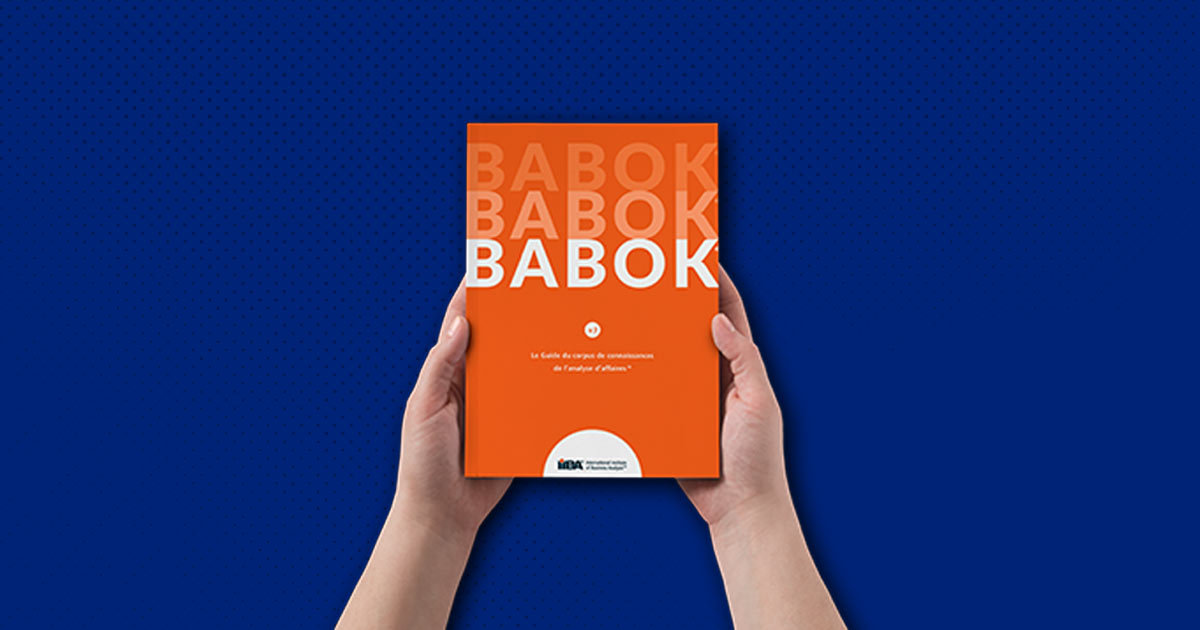Introducing BABOK French version
Receive free IIBA updates and exclusive content!
As a global standard, the BABOK® Guide aims to standardize the practice of business analysis globally so that this profession can create maximum value to organizations. Reaching this goal requires successful deployment and adoption of this standard regardless of the organization’s context. The language used within this context is one of the main factors that influences deployment success. In that spirit, we can therefore consider the value added by the translation of BABOK Guide in French. It enables business analysts, in a French-speaking environment, to carry out their tasks embracing BABOK Guide standard by using, on the other hand, the language which represents, in this environment, a fundamental mean of communication and collaboration among stakeholders. Thus, the French version of BABOK Guide embodies the bridge ensuring the connection between the BABOK Guide standard and its linguistically adapted practice.

The value provided by the BABOK French translation can be appreciated from many points of view. The extent of this value includes the business analyst, the business analysis profession, especially in a French-speaking environment, as well as the business domain where the business analyst works. In the following, the value proposition will be scrutinized from different viewpoints.
- Business analysts They are the primary value recipients of this translated version from different perspectives:
- Knowledge acquisition. Each business analyst has certainly built up during their experiences, in the French-speaking environments, a massive French vocabulary background. Consequently, it will not be easy for them to replace it abruptly with a new vocabulary. Such a constraint would impede business analyst to leverage effectively the knowledge contained in the BABOK guide. To satisfy such a need, the translation of the BABOK offers the business analyst the opportunity to update their knowledge and to acquire new ones while preserving their linguistic and terminological knowledge. Better yet, translating the BABOK Guide helps them improve their vocabulary by aligning it with the standard.
- Personal development. No one doubts the importance of certification whether it be for self-satisfaction or for gaining increased recognition in the job market. As the root basis of business analysis knowledge, the BABOK Guide remains the core source to enable one to prepare for certification exams and earn the related IIBA certificates. Hence, the French version of the BABOK has a high positive impact as an enabling factor helping the business analyst to increase their chances by using their native language skills for the preparation for the certification.
- Applying the Knowledge. In a professional environment made up of different stakeholder profiles and an extensive vocabulary, the BABOK French version is considered as the main reference allowing business analysts to introduce changes and apply principles from the BABOK while avoiding resistance and negative reactions due to gaps in the vocabulary. This, obviously, promotes easier adherence and adoption by all stakeholders to the BABOK guide.
- Business analysis profession. The benefits of the French version of the BABOK Guide upon the profession should be examined from two perspectives:
- Vocabulary standardization. Capitalizing on a current vocabulary while aligning it with a standard framework helps the whole community of business analysts to use the same vocabulary in a unique and universal way. This, obviously, avoids the risks of confusion and discrepancies between business analysts during oral or written communications. This advantage will promote the development of the profession itself within the community.
- Continuous improvement. The French version of BABOK enables the business analysis profession to meet the needs of its context in terms of linguistic specificities while remaining in touch with the worldwide practice and evolution of this profession. This will certainly guarantee continuous improvement by leveraging the progress and innovations that this profession is constantly experiencing.
- Business domain. As a client of the business analysis efforts, the business domain benefits from an overall value growth created by the business analysis thanks to the convergence of all the various advantages mentioned including this French translation of the BABOK Guide.
In conclusion, the French version of BABOK supports the main mission of BABOK which aims to standardize the practice of business analysis globally. This support is materialized through a successful and valuable deployment of BABOK in French-speaking communities.
Complimentary with IIBA Membership, this edition helps our French Members understand the foundational knowledge of business analysis in their own native language.
About The Author:

University graduate in computer science, he has accumulated 19 years of experience in the field of information technology in various contexts. He has held different roles as an IT business analyst, as an information technology manager in the telecommunications industry, then currently, as a business process analyst (analysis and modeling). This broad experience has been confirmed by two worldwide recognized certificates, the CBAP “Certified Business Analysis Professional” issued by IIBA and the CISA “Certified Information Systems Auditor®” issued by ISACA.
Présentation de la version française de BABOK
(BABOK en Français)
Étant une norme mondiale, le guide BABOK a pour mission de standardiser la pratique de l’analyse d’affaires dans les quatre coins du monde afin que ce métier puisse apporter le maximum de la valeur au sein des organisations. Pour que ce but soit atteint, il faut assurer un déploiement et une adoption réussis de cette norme quel que soit le contexte de l’organisation. Un des facteurs fondamentaux qui déterminent ce succès est bien la langue qui caractérise le contexte d’utilisation. Sous cet angle, on peut considérer donc la valeur apportée par la traduction du BABOK en Français. Elle permet à l’analyste d’affaires, dans un milieu francophone, de mener ses tâches autour de la norme BABOK mais avec la langue qui représente, dans ce milieu, un pilier fondamental pour la communication et pour la collaboration entre les parties prenantes. Ainsi, la version en Français du BABOK incarne le canal assurant la jointure entre la norme BABOK et son application adaptée linguistiquement.
La valeur apportée par la traduction du BABOK en Français peut être appréciée à plusieurs niveaux. Sa portée comprend en effet l’analyste d’affaires, la profession d’analyse d’affaires, notamment dans les milieux francophones, ainsi que le domaine d’affaires dans lequel collabore l’analyste d’affaires. Dans ce qui suit, on ventilera cette valeur sur les différents niveaux.
- Analyste d’affaires. Il est le premier bénéficiaire de cette traduction sur plusieurs plans :
- Acquisition des connaissances. Chaque analyste d’affaires a certainement construit au cours de ses expériences, dans des milieux francophones, un bagage vocabulaire massif en Français. Par conséquent, il ne lui sera pas évident de le remplacer radicalement par un nouveau vocabulaire. Une telle contrainte aurait construit une barrière non négligeable entre l’analyste d’affaires et l’accès efficace aux connaissances contenues dans le guide BABOK. Pour satisfaire un tel besoin, la traduction du BABOK lui offre la possibilité d'actualiser ses connaissances et d'en acquérir de nouvelles tout en conservant ses acquis linguistiques et terminologiques. Mieux encore, la traduction du BABOK favorise l’amélioration de son vocabulaire en l’alignant avec la norme.
- Développement personnel. Nul ne doute de l’importance de la certification pour avoir une satisfaction de soi-même ou pour gagner un atout valorisant sur le marché d’emploi. En tant que socle des connaissances de l’analyse d’affaires, le BABOK reste, par excellence, la source principale pour bien préparer l’examen de certification pour plusieurs certificats. Pour cela, la traduction du BABOK joue un rôle capital en tant qu’élément facilitateur, permettant à l’analyste d’affaires d’augmenter ses chances en réutilisant ses acquis linguistiques au cours de la préparation pour la certification.
- Mise en œuvre des connaissances. Dans un milieu professionnel constitué de différents profils de parties prenantes et qui regorge d’un existant linguistique important, la traduction en Français est considérée comme le garant principal permettant à l’analyste d’affaires d’introduire des changements et de mettre en œuvre les connaissances et les principes du BABOK, sans pour autant créer un choc et faire face à une résistance due à des écarts de vocabulaire. Ceci favorise, évidement, une adhésion plus facile de toutes les parties prenantes à l’adoption du BABOK.
- Profession d’analyse d’affaires. L’impact de la traduction sur le métier globalement peut être abordé dans une double perspective.
- Harmonisation du vocabulaire. Le fait de capitaliser sur un existant linguistique en le mettant dans un cadre standard, permet à toute la communauté d’analystes d’affaires d’utiliser le même vocabulaire d’une manière unique et universelle. Ceci permet d’éviter, en toute évidence, les risques de confusion et d’écarts entre les analystes que ça soit lors d’un échange oral ou écrit. Cet avantage favorisera le développement du métier lui-même au sein de la communauté.
- Amélioration continue. La traduction du BABOK permet au métier d’analyse d’affaires de satisfaire les besoins de son contexte en termes de spécificités linguistiques tout en restant en lien avec la pratique et l’évolution de ce métier au niveau mondial. Ceci lui garantira certainement une amélioration continue en bénéficiant des progrès et des nouveautés que cette profession connait continuellement.
- Domaine d’affaires. En tant que client et bénéficiaire principal des efforts de l’analyse d’affaires, les différents avantages mentionnés ci-dessus, par rapport à la traduction en Français du BABOK, convergent tous vers la croissance de la valeur globale crée par l’analyse d’affaires pour son environnement.
En conclusion, la traduction en Français appuie la mission principale du BABOK qui vise à normaliser la pratique de l’analyse d’affaire dans le monde entier. Cet appui est concrétisé à travers un déploiement réussi et valorisant du BABOK dans les milieux francophones.
Gratuite avec l'adhésion à l'IIBA, cette édition aide nos membres français à comprendre les connaissances fondamentales de l'analyse commerciale dans leur propre langue maternelle.
A propos de l'auteur:

Abdelilah Fquihi, Analyste d'affaires chez Cofomo De formation universitaire en informatique, il cumule 19 ans d’expérience dans le domaine des technologies de l’Information dans des contextes variés. Il a assuré plusieurs rôles en tant qu'analyste d’affaires en TI, en tant que gestionnaire des technologies de l’information dans le secteur des télécommunications, puis présentement, en tant qu'analyste des processus d'affaires (analyse et modélisation). Cette large expérience a été confirmée par deux certificats reconnus mondialement, le CBAP « Certified Business Analysis Professional » délivré par IIBA et le CISA « Certified Information Systems Auditor®» délivré par ISACA.
